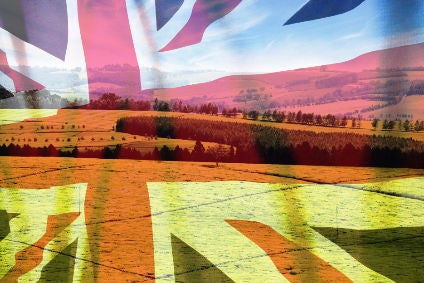
Amid the uncertainty over the UK’s trading relationship with the EU post-Brexit, a parliamentary committee has said it is imperative the country’s government undertakes a comprehensive analysis to assess the impact on the food sector.
The House of Commons’ Environment, Food & Rural Affairs Committee (EFRA) said the analysis must be undertaken before a new UK agricultural bill due this spring which is set to outline post-Brexit support arrangements for farmers.

Discover B2B Marketing That Performs
Combine business intelligence and editorial excellence to reach engaged professionals across 36 leading media platforms.
Should the UK fail to agree a free-trade agreement with its EU partners when it officially exits the bloc, World Trade Organization tariffs are likely to kick in, which the committee says in a report will have a “significant impact upon agriculture as tariffs are higher for agricultural products than for other goods and services”.
Noting the EU is the UK’s single largest trading partner in agri-food products, accounting for 60% of exports and 70% of imports, the EFRA committee said the sheep, dairy and cereals sectors, those particularly dependent on the export market, would be most affected.
The committee urged the UK’s Department for Environment, Food & Rural Affairs (Defra) to take the lead in a sectoral study on the impact from Brexit on the food industry following similar works by the Agriculture & Horticulture Development Board, a body funded by farmers and growers.
“While we recognise and welcome work that has been done by organisations such as AHDB in providing detailed sectoral analysis on the impact of tariffs on the UK’s agricultural sectors, it is imperative that Defra undertakes similar work as a matter of urgency to evaluate the impact of any deal that the government might be negotiating,” the committee said in its Brexit: Trade in Food report, published yesterday (18 February).

US Tariffs are shifting - will you react or anticipate?
Don’t let policy changes catch you off guard. Stay proactive with real-time data and expert analysis.
By GlobalData“The Government needs to support British farming and agriculture in preparing for business post-Brexit. Defra should consider providing a fund to support our food-producing industry to adapt effectively to the challenge ahead.”
Reverting to WTO tariffs would push up UK food prices, raising costs for consumers, the committee said, adding the country’s standards on animal welfare and food standards could be at risk post-Brexit.
Careful consideration needs to be applied to UK food sectors such as dairy, where there is a balance between exports and imports, to see what support can be offered to make them more productive, and ultimately keep prices down and farmers in business, the committee said.
While the new agricultural bill is pressing, the committee urged more detail on what quota systems the industry can expect outside of a free-trade deal.
“We call on the government to announce these quotas as soon as possible, so that the UK agricultural industry can have trading certainty for 2019 and onwards.”
A better flow of information and more freely available details appear to be EFRA’s key concerns, with the committee calling for government responses on how it will deal with potential regulatory divergences across borders, what systems it will put in place to avoid delays in the movement of goods, and tighter controls on country-of-origin labelling.
The UK’s food industry needs time to plan for all eventualities, the EFRA committee said, noting the potential to secure free-trading deals with countries outside the EU.
“On leaving the EU, if there is no customs union, the UK will be able to pursue free trade agreements with non-EU countries. It is essential that the Government identify those countries where resources should be targeted. The Government must start developing relationships at a high political level with potential trading partners in order to ensure that agreements are signed to the benefit of the UK.”





